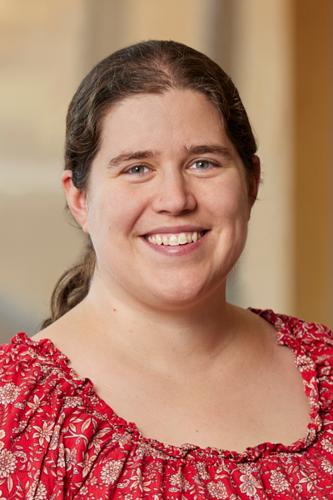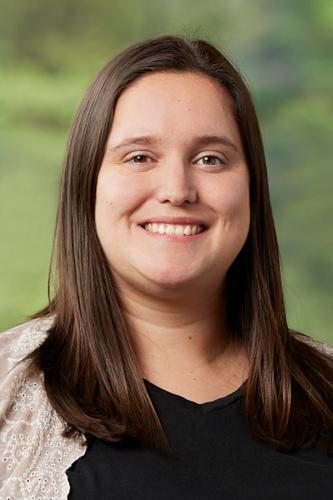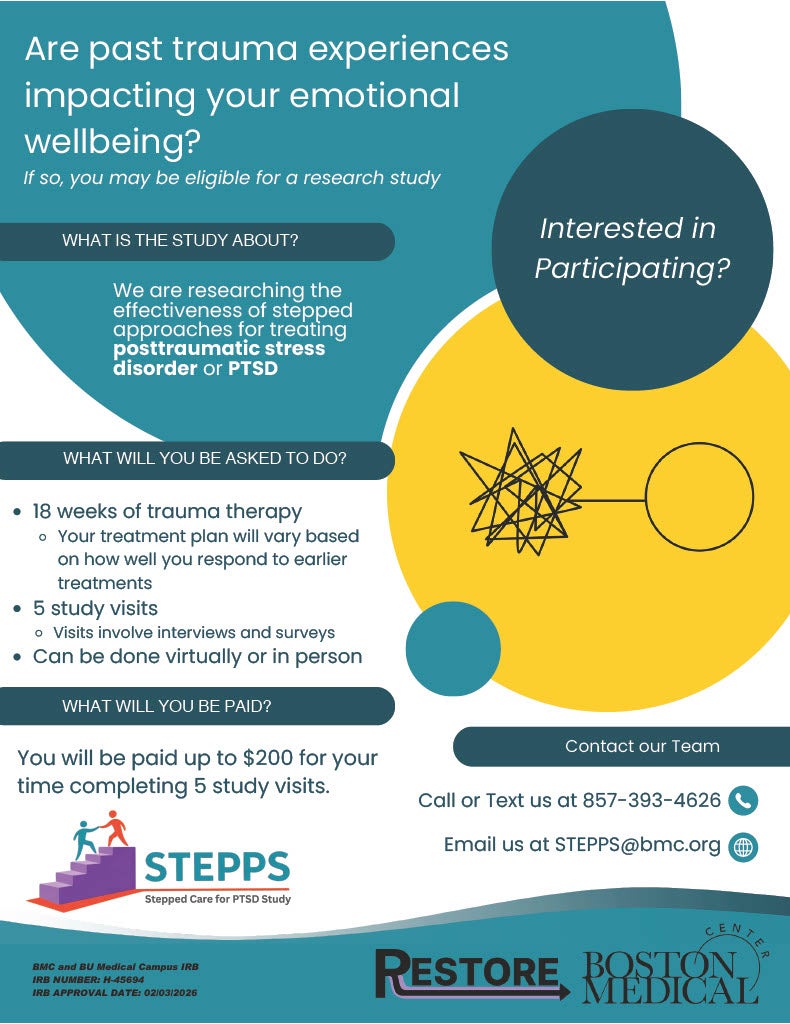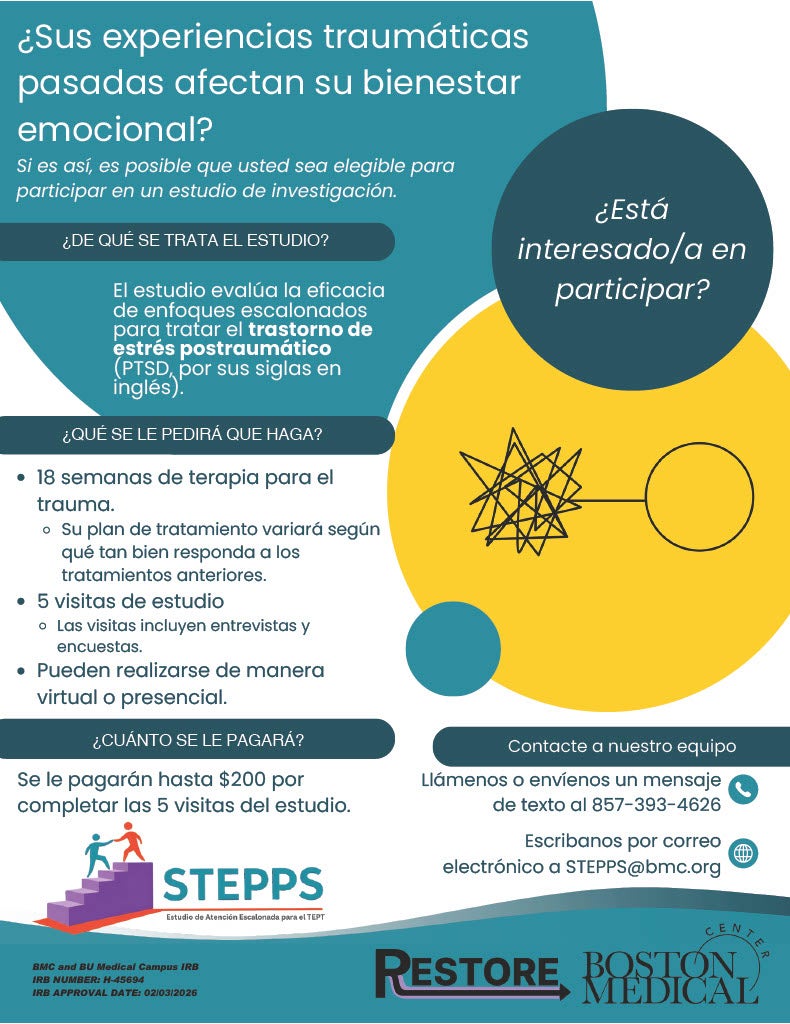REcovery from Stress and Trauma through Outpatient care, Research, and Education
The RESTORE Center provides evidence-based mindfulness and cognitive behavioral treatments for posttraumatic stress disorder (PTSD) and other programs focused on resisting oppression-based stress.
Call 911 in case of a medical emergency or immediate safety concern.
Call the BEST Team for 24 Hour Psychiatric Crisis (800) 981-HELP (4357)
Call or Text 988 for the National Suicide and Crisis Lifeline
What is trauma?
Trauma events usually involve life threat, serious injury, or sexual harm. These events are experienced as overwhelming or uncontrollable, and can happen to anyone. Potentially traumatic events include child abuse, domestic violence/partner violence, combat, sudden/unexpected loss of a loved one, car accident, sexual abuse/violence, and natural disasters (e.g., hurricane).
What are commons reactions to trauma?
Trauma events affect people differently. Exposure to trauma is a common reality and we recognize the wide range of historical and current experiences that contribute to our patients’ distress. Emotional and behavioral responses to trauma are shaped by our earlier experiences. If these experiences include chronic adversity – maltreatment, poverty, discrimination, ancestral trauma– long term problems may occur. Long term reactions to trauma can include changes in emotions, relationships, schoolwork, job performance, and overall life. At the same time, we see our patients’ resilience and capacity to survive, heal and thrive despite these adversities.
What is PTSD?
Posttraumatic Stress Disorder (PTSD) is a specific mental health condition that can develop after you experience or witness a traumatic event. Symptoms associated with traumatic events can develop soon after the event or can emerge much later. Symptoms can last for a few days, weeks, or much longer. The good news, is that trauma related problems respond well to treatment.
PTSD symptoms are generally grouped into four categories: re-experiencing, avoidance, negative changes in thinking or mood, and changes in physical and emotional reactions. Symptoms can change over time and are different from person to person.
- Re-experiencing symptoms. Memories of the traumatic event can come back at any time. They can feel very real and scary. For example, you may have nightmares or flashbacks.
- Avoiding things that remind you of the event. You may try to avoid talking or thinking about the trauma event as well as situations or people that remind you of the traumatic event.
- Having more negative thoughts and feelings than before the event. The way you think about yourself and others may become more negative following the trauma. Common emotions following a trauma include feeling numb, guilt, anger, or shame.
- Changes in physical and emotional reactions. Following a trauma, you may be jittery, easily startled, always alert and on the lookout for danger, suddenly become angry or irritable, or have trouble sleeping or concentrating.
Contact Us: Reach out to RESTORE Clinical and Project Coordinator at (617-414-2340) or restore@bmc.org for questions about the RESTORE Center including:
- Scheduling/rescheduling appointments
- Directions to offices
- Learning more about any of the services we provide
- Other questions about the program
Treatment & Services for PTSD
The RESTORE Center offers a variety of service and treatment options for patients. We provide evidence-based treatments for PTSD, meaning the therapies we offer have been researched and shown to be effective. These treatments are tailored to meet the needs of our patients' preference and cultural expectations. Patients' work with their provider to select the treatment option that best fits their needs and can choose from coping skill treatments (lower intensity) to trauma focused treatments (higher intensity) or a series of treatments. Current treatment options are described below.
Cognitive Processing Therapy (CPT)
CPT is a specific type of cognitive (thoughts) behavioral (actions) therapy that is effective in reducing symptoms of PTSD. CPT helps patients learn how to challenge and modify unhelpful beliefs related to the trauma. Patients adopt a new understanding (meaning) their trauma, which reduces the impact of the trauma on their current lives. CPT is a strongly recommended first-line treatment for PTSD and is generally 12 appointments.
Written Exposure Therapy (WET)
WET is a brief treatment in which patients write continuously about their target trauma for a portion of each session. Patients write about the same trauma for all WET appointments. Writings include what you were thinking and feeling during the event and then talking with your provider about the writing session. This can help you get relief from PTSD symptoms. WET is generally 5 appointments.
Brief Skills Training in Affective & Interpersonal Regulation (STAIR)
Brief STAIR is a coping skill-based treatment tailored to the needs of each patient. This treatment can improve trauma related issues in emotion management and social and relationship effectiveness. A person receiving the treatment can (1) develop effective coping skills for distressing feelings; (2) learn how to become more aware and comfortable with their emotions; (3) identify unhealthy relationship patterns; and (4) strengthen skills to improve relationships. Brief Stair is generally 5 appointments.
Web-administered STAIR (webSTAIR)
A web-administered self-help version of Brief STAIR that will be available in English and Spanish. WebSTAIR consists of 10 online modules that teach skills to improve coping with emotions and improve relationships. Modules are completed at patients’ own pace and utilize interactive exercises, worksheets, or audio and video components to deliver the treatment. Our team provides coaching support to help patients’ progress through this program.
Additional Supports
We also support patients with medication evaluation, medication management, and engagement with community resources or organizations to provide holistic care.
What is Oppression-Based Stress (OBS)?
Experiences of discrimination and oppression, such as racism, can lead to a variety of physical and mental health consequences such as general distress, anxiety, depression or symptoms comparable to PTSD.
Services for Oppression-Based Stress
Reconnect: A Black Wellness Group for the Emotional Impact of Racism
The Reconnect Group is an 8-session education and skill-building group focused on the physical and mental health impacts of racism. Group members will learn coping skills for managing the emotional impact of racism-based stress and trauma. Skills include identifying racism-based stress and trauma responses, mindfulness and behavioral coping strategies, narrative ways to process emotions (storytelling), and reconnecting to family and community supports
Service Delivery Strategies:
RESTORE uses a variety of service delivery strategies to maximize the reach and effectiveness of our treatments, and to support patient engagement.
These strategies include:
- Community health worker support (coaching, engagement)
- A guiding patient advisory board to ensure we are meeting our mission
- Culturally responsive tailoring interventions and treatment plans
- Closely monitoring treatment progress to support outcomes and engagement
- Using clinic information to inform best practice for stepping or sequencing treatments
Clinical Training and Consultation Services
RESTORE provides opportunities for clinical training and consultation. For additional
information please contact Dr. Sarah Valentine, RESTORE director, at sarah.valentine@bmc.org.
Our Team
Sarah E Valentine, PhD

Anna Kancharla, LCSW

Maura Lester, LCSW

Jessica McCaffery, LCSW

Amanda Rodrigues, LCSW

Eryn Yamin, MD

Kalo Sokoto, PhD

Nuha Alshabani, PhD
Courtney Kaiser, MD
Kalo Sokoto, PhD
Joselyn Gil, BS
Deanna Biddy, CHW
Zoey Goldberg, BS
Anna Fong, BS
Related Research
Our Research Projects
Peer-Reviewed Publications
McCuistian C, Kimball SL, Buitron de la Vega P, Godfrey L, Fortuna LR, Valentine SE. Consideration of racism experiences in implementation of trauma therapy in primary care. Health Services Research. 2022 Dec; 57 (2): 235-248. doi:10.1111/1475-6773.13998. PMID: 35521941; PMCID: PMC9660427.
Salomaa AC, Livingston NA, Bryant WT, Herbitter C, Harper K, Sloan CA, Hinds Z, Gyuro L, Valentine SE, Shipherd JC. A Bottom-Up Approach to Developing a Unified Trauma-Minority Stress Model for Transgender and Gender Diverse People. Psychological Trauma: Theory, Research, Practice, and Policy. 2022 Oct 6. doi:10.1037/tra0001373. PMID: 36201832.
Valentine SE, Fuchs C, Godfrey L, Elwy AR. Redesign of a brief PTSD treatment in safety net integrated primary care: Supporting implementation in the context of the Covid-19 pandemic. General Hospital Psychiatry. 2022; 74: 94-101. https://doi.org/10.1016/j.genhosppsych.2021.12.004
Valentine SE, Fuchs C, Carlson M, Elwy AR. Leveraging multi-stakeholder engagement to develop an implementation blueprint for a brief trauma-focused cognitive behavioral therapy in primary care. Psychological Trauma: Theory, Research, Practice, and Policy. 2021 October 18. doi:10.1037/tra0001145. PMID: 34661421
Valentine SE, Smith AM, Vo L, Stewart K, Lisle, I. A consultation with feedback approach to supporting fidelity to a peer-delivered intervention for posttraumatic stress disorder. Implementation Research and Practice. 2021 May 31. doi: 10.1177/26334895211017280
Ametaj AA, Smith AM, Valentine SE. A stakeholder-engaged process for adapting an evidence-based intervention for posttraumatic stress disorder for peer Delivery. Adm Policy Ment Health. 2021 Apr 04. doi: 10.1007/s10488-021-01129-3. PMID: 33813717
Smith AM, Stewart K, Baul T, Valentine SE. Peer delivery of a brief cognitive-behavioral treatment for posttraumatic stress disorder: A hybrid effectiveness-implementation pilot study. Journal of Clinical Psychology. 2020; 76 (12): 2133-2154. doi: 10.1002/jclp.23020. PMID: 32632945; PMCID: PMC7665989
Valentine SE, Shipherd JC, Smith AM, Kauth MR. Improving affirming care for sexual and gender minority veterans. Psychological Services. 2019; ePub. doi: 10.1037/ser0000378. PMID: 31343189; PMCID: PMC6980924
Valentine SE, Marques L, Wang Y, Ahles EM, Dixon De Silva L, Alegria M. Gender differences in exposure to potentially traumatic events and diagnosis of posttraumatic stress disorder (PTSD) by racial and ethnic group. General Hospital Psychiatry. 2019; 61:60-68. doi: 10.1016/j.genhosppsych.2019.10.008. PMID: 31715388; PMCID: PMC6870874
Valentine SE, Ahles EM, Dixon De Silva LE, Patrick KA, Baldwin M, Chablani-Medley A, Shtasel DL, Marques L. Community-based implementation of a paraprofessional-delivered cognitive behavioral therapy program for youth involved with the criminal justice system. Journal of Health Care for the Poor and Underserved. 2019; 30(2):891-915. doi: 10.1353/hpu.2019.0059.PMID: 31130554; PMCID: PMC6541016
Marques L, Valentine SE, Kaysen D, Mackintosh M, Dixon De Silva LE, Ahles EM, Youn S, Shtasel DL, Simon NM, Wiltsey-Stirman S. Provider fidelity and modifications to Cognitive Processing Therapy in a diverse community health clinic: Associations with clinical change. Journal of Consulting and Clinical Psychology. 2019; 87(4):357-369. doi: 10.1037/ccp0000384.PMID: 30883163; PMCID: PMC6430611
Youn S, Valentine SE, Patrick KA, Baldwin M, Chablani-Medley A, Aguilar Silvan Y, Shtasel DL, Marques L. Practical solutions for sustaining long-term academic-community partnerships. Psychotherapy. 2019; 56(1):115-125. doi: 10.1037/pst0000188. PMID: 30475057; PMCID: PMC6657495
Valentine SE, Shipherd JC. A systematic review of social stress and mental health among transgender and gender non-conforming people in the United States. Clinical Psychology Review. 2018; 66: 24-38. doi: 10.1016/j.cpr.2018.03.003. PMID: 29627104; PMCID: PMC6663089
Baldwin M, Chablani-Medley A, Marques L, Schiraldi V, Valentine SE, Zeira Y. Cognitive behavioral theory, young adults, and community corrections: Pathways for innovation. Program in Criminal Justice Policy and Management, Harvard Kennedy School, April 2018.
Valentine SE, Nobles CJ, Gerber MW, Vaewsorn AS, Shtasel DL, Marques L. The association of posttraumatic stress disorder and chronic medical conditions by ethnicity. Journal of Latina/o Psychology. 2017; 5(3): 227-241. doi: 10.1037/lat0000076. PMID: 28944108; PMCID: PMC5606338
Nobles CJ, Valentine SE, Zepeda ED, Ahles EM, Shtasel DL, Marques L. Usual course of treatment and predictors of treatment utilization for patients with posttraumatic stress disorder. Journal of Clinical Psychiatry. 2017; 78(5): e559-e566. doi: 10.4088/JCP.16m10904.PMID: 28570794; PMCID: PMC5454778
Nobles CJ, Valentine SE, Zepeda ED, Wang Y, Ahles EM, Shtasel DL, Marques L. Residential segregation and mental health among Latinos in a nationally representative survey. Journal of Epidemiology and Community Health. 2017; 71(4): 318-323. doi: 10.1136/jech-2016-208034. PMID: 27885049; PMCID: PMC5344758
Valentine SE, Borba CPC, Dixon L, Vaewsorn AS, Gallegos Guajardo J, Resick PA, Stirman SW, Marques L. Cognitive processing therapy for Spanish-speaking Latinos: A formative study of a model-driven cultural adaptation of the manual to enhance implementation in a usual care setting. Journal of Clinical Psychology. 2017; 73(3): 239-256. doi: 10.1002/jclp.22337. PMID: 27378013; PMCID: PMC5215988
Marques L, Dixon L, Valentine SE, Borba CPC, Simon NM, Wiltsey-Stirman S. Providers' perspectives of factors influencing implementation of evidence-based treatments in a community mental health setting: A qualitative investigation of the training-practice gap. Psychological Services. 2016; 13(3): 322-331. doi: 10.1037/ser0000087. PMID: 27281696; PMCID: PMC4980224
Nobles CJ, Valentine SE, Borba CPC, Gerber MW, Shtasel DL, Marques L. Black-white disparities in the association between posttraumatic stress disorder and chronic illness. Journal of Psychosomatic Research. 2016; 85: 19-25. doi: 10.1016/j.jpsychores.2016.03.126. PMID: 27212665; PMCID: PMC4879687
Valentine SE, Dixon L, Borba CPC, Shtasel DL, Marques L. Mental illness stigma and engagement in an implementation trial for Cognitive Processing Therapy at a diverse community health center: a qualitative investigation. International Journal of Culture and Mental Health. 2016; 9(2):139–150. doi: 10.1080/17542863.2015.1123742. PMID: 27796256; PMCID: PMC4972095
Marques L, Eustis EH, Dixon L, Valentine SE, Borba CP, Simon NM, Kaysen D, Wiltsey-Stirman S. Delivering cognitive processing therapy in a community health setting: The influence of Latino culture and community violence on posttraumatic cognitions. Psychological Trauma: Theory, Research, Practice, and Policy. 2016; 8(1): 98-106. doi: 10.1037/tra0000044. PMID: 25961865; PMCID: PMC4641844
Textbook Chapters
Pantalone DW, Gorman KR, Pereida ET, Valentine SE. Addressing trauma-related distress among sexual and gender minority populations. In Rothblum ED, ed. The Oxford Handbook of Sexual and Gender Minority Health. 2020; Oxford, UK: Oxford University Press. doi: 10.1093/oxfordhb/9780190067991.013.7
Valentine SE, Woulfe J, Shipherd JC. An evidence-based approach to conceptualizing trauma responses among transgender and gender non-conforming (TGNC) adults (pp. 268-290). In Safren SA, Pachankis J, eds. The Handbook of Evidence-based Mental Health Practice with LGBT Clients. 2019; Oxford, UK: Oxford University Press. doi: 10.1093/med-psych/9780190669300.003.0012
Pantalone DW, Valentine SE, Shipherd JC. Working with survivors of trauma in the sexual minority and transgender/gender nonconforming population (pp. 183-211). In DeBord K, Fischer AR, Bieschke K, Perez T, eds. The Handbook of Sexual Orientation and Gender Diversity in Counseling and Psychotherapy. 2016; Washington, DC: American Psychological Association.
Published Educational Resources
Valentine SE, Livingston NA, Salomaa AC, Shipherd JC. Assessment and Treatment Considerations for Working with LGBTQ+ Clients with PTSD—Provider Fact Sheet. National Center for Posttraumatic Stress Disorder, US Department of Veterans Affairs. Available March 2022. https://www.ptsd.va.gov/professional/treat/specific/assessment_considerations_lgbtq.asp
Valentine SE, Livingston NA, Salomaa AC, Shipherd JC. Trauma, discrimination and PTSD among LGBTQ+ people—Provider Fact Sheet. National Center for Posttraumatic Stress Disorder, US Department of Veterans Affairs. Available March 2022. https://ptsd.va.gov/professional/treat/specific/trauma_discrimination_lgbtq.asp
STEPP Study
STEPP (Stepped Care for PTSD) Study: Now recruiting!



